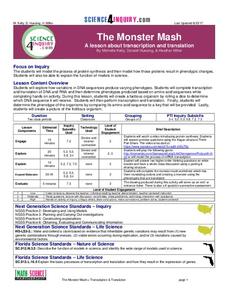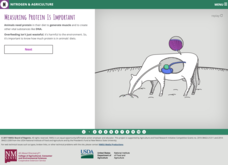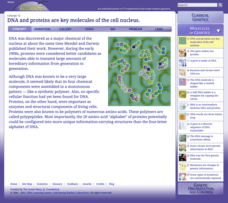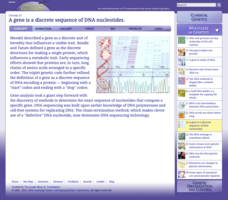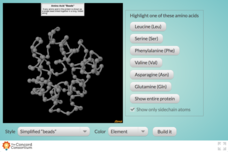Science 4 Inquiry
The Monster Mash
Young scientists create monsters by applying their knowledge of transcription and translation. They randomly find the DNA, assign it a codon, and build monsters piece by piece.
Science 4 Inquiry
The Last Supper: Identifying Macromolecules
Why do medical examiners always state the contents of a person's stomach? Scholars learn about the importance of macromolecules through a case study of stomach contents. They perform multiple tests to determine a conclusion before they...
Curated OER
Regents High School Examination: Living Environment 2009
Emerging ecologists need a full understanding of life, from the inner workings of a cell to the complex relationships among organisms. This examination is meant to assess high schoolers after an entire year course on the living...
Curated OER
Regents High School Examination: Living Environment 2003
The living environment, from the interior of a cell to the complex relationships among populations, are queried in this final examination. Learners look at air pollution maps, diagrams of cells, population graphs, and drawing of cells....
Curated OER
Regents High School Examination: Living Environment 2005
The 2005 version of the Regents High School Examination in the area of ecology is as comprehensive as previous years' exams. It consists of 40 multiple choice questions on everything from the structure of DNA to the interactions within...
Curated OER
Regents High School Examination: Living Environment 2007
Environmental science enthusiasts show what they know at the end of the year by taking this full-fledged final exam. They answer multiple choice, graph interpretation, and essay analysys questions, 73 of them in all. Topics range from...
Curated OER
Regents High School Exam: Living Environment 2008
Tne New York Regents High School Examinations are comprehensive and include various styles of questions, includingmultiple choice and the analysis of graphs. This particular version, the 2008 Living Environment exam surveys a variety of...
Curated OER
Regents High School Examination: Biology 2006
Twenty-six pages of biology questions, mostly in multiple-choice form, are included in the all-encompassing New York State Regents exam. It assesses every topic typically covered in a high-school biology course. Create your own answer...
Exploratorium
Secret Codon - Write a Message in DNA
String up a message. Pupils string together colored beads to code a word or short phrase. Each color represents one of the four DNA bases. Using a combination of three bases, learners create an amino acid that stand for each letter of...
Learning Games Lab
Nitrogen in Feed
Knowing what farmers are feeding livestock is just smart business. A WebQuest lesson helps learners build an understanding of the relationship between amino acids, nitrogen, and protein. With interactive instruction,...
College Board
2013 AP® Biology Free-Response Questions
AP® free-response questions are often challenging for scholars. Give them practice writing free-response questions using former questions from the AP® Biology exam on topics such as genetic mutations, cellular respiration, evolution, and...
Howard Hughes Medical Institute
Natural Selection and Evolution of Rock Pocket Mouse Populations
Can evolution repeat itself? Scholars analyze amino acid data in two separate populations of mice. They learn that evolution repeats itself, but natural selection prefers some mutations over others in different environments. Analysis...
Howard Hughes Medical Institute
How Do Fibers Form?
The proteins inside a cell determine the shape of the cell. While most red blood cells have a circular shape, those with sickle cell take the shape of a sickle. This change in shape causes multiple issues in the system. Scholars solve...
College Board
2015 AP® Biology Free-Response Questions
Many future doctors earn college science credit by passing the AP biology test while still in high school. Help young scientists prepare for the exam by studying past test questions. Each of the eight questions covers multiple topics...
Cold Spring Harbor Laboratory
DNA and Proteins Are Key Molecules of the Cell Nucleus
When DNA research first began, it required almost an entire day to extract the molecules from a cell nucleus. Now it requires less than an hour. Scholars learn about the early theories of DNA with an online interactive, videos,...
Cold Spring Harbor Laboratory
A Gene Is a Discrete Sequence of DNA Nucleotides
Frederick Sanger won two Nobel prizes for protein sequencing and DNA sequencing. Young scientists learn about Dr. Sanger's research and amazing discoveries. They read an article and a biography, view videos and animations, and apply...
Cold Spring Harbor Laboratory
DNA Words Are Three Letters Long
DNA writes 64 different words but only codes for 20 different amino acids. Budding scientists learn about where each of these numbers come from and why they aren't equal with an online interactive. The resource explains the research, the...
Biology Junction
Proteins
Besides water, more protein exists in the body than any other substance. Young scientists discover the importance of protein's role in our bodies and the relationship with amino acids. A helpful presentation shares many examples of amino...
Howard Hughes Medical Institute
BCR-ABL: Cancer Protein Structure and Function
How do scientists discover treatments for cancer? A presentation and accompanying worksheet explain how one cancer spreads and a theory of how to stop it. It details the trials and relapses after using the medication. Scholars learn...
Serendip
A Scientific Investigation – What Types of Food Contain Starch and Protein?
You are what you eat, as they say! Are you more starch or more protein? Young scholars use their knowledge of each component to test different foods for their content. Using multiple indicators, individuals describe the protein and...
Howard Hughes Medical Institute
The Proteasome and Protein Regulation
What is a proteasome? Like tiny trash compactors inside cells, proteasomes turn worn-out proteins into reusable amino acids! Explore the topic with a presentation and embedded simulations. The resource includes a teacher's reference and...
Cornell University
The Making of Macromolecules
Compare and contrast macromolecules made from the same elements. Young scholars learn how the structure of a molecule has as much influence on a compound as the elements in the molecule. They experiment with molecular model kits to...
Concord Consortium
Exploring Hydrophobic Core
How do the hydrophobic and hydrophilic regions of a protein affect its shape? Science scholars explore the molecular properties of protein molecules using a detailed interactive. The resource allows the user to rotate the protein, view...
Concord Consortium
Exploring Protein 3D Structure
Presenting protein structure can be difficult! Take young biologists on a 3-D amino acid adventure with a detailed interactive. Pupils view and manipulate common amino acids individually or as a part of a whole protein. Choose from three...


